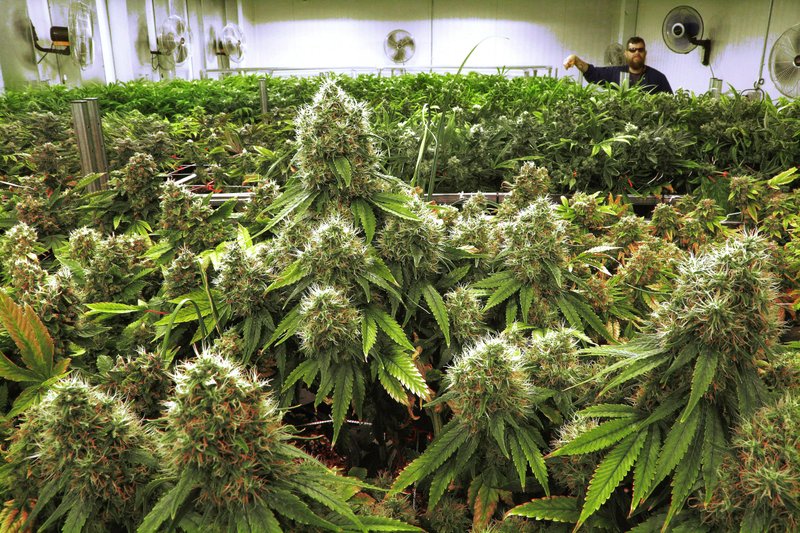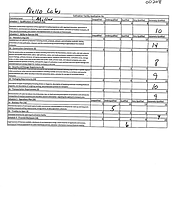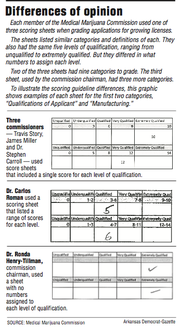Arkansas Medical Marijuana Commission members used different scoring guides when ranking cannabis growing license applications earlier this year, and the scores that commissioners gave depended on which guide was used, according to information obtained from the commission.
The drug, legalized in 2016, remains unavailable in Arkansas. A circuit judge has barred the issuance of growing permits, finding fault in the commission's process for ranking marijuana cultivation applicants. That ruling has been appealed to the Arkansas Supreme Court.
The score-card discrepancy is the latest in a series of irregularities in the licensing process uncovered by unsuccessful applicants, lawmakers and media outlets. An attorney who specializes in cannabis litigation said the issue with the score cards is troublesome, and one lawmaker has renewed calls for the process to be scrapped and restarted.
The differences in the scoring sheets were:
• Commissioners Travis Story, James Miller and Dr. Stephen Carroll turned in score sheets that showed the grader what the top possible score was for each category. For example, 14 points was the maximum score for an applicant that was "extremely qualified" in the manufacturing category.
• Commissioner Carlos Roman used a scoring guide that listed a range of possible scores for each category. For instance, an "extremely qualified" applicant could be assigned 12-14 in the manufacturing category.
[DOCUMENT: See an example of the different rubrics used by Medical Marijuana Commission members]
• Lastly, the chairman, Dr. Ronda Henry-Tillman, used a guide without any numbers assigned to each level of qualification.
Although three scoring sheets were in use, each commissioner stuck with the same one he or she used throughout the grading.
The effect of the subtle differences in guides was that Henry-Tillman and Roman consistently gave applicants scores below the maximum amount allotted for each level of qualification, an Arkansas Democrat-Gazette analysis of scoring data found.
Meanwhile, Story, Miller and Carroll always gave the maximum allowable score for each qualification level, the newspaper's review of 20 companies' scores found. Choosing the maximum score inhibited the three commissioners' ability to acknowledge small quality distinctions between the 83 competing applicants they graded.
On 20 applications reviewed by the Democrat-Gazette, Henry-Tillman and Roman assigned scores below the maximum amount for a qualification level 109 times -- about 30 percent of the scores.
The state Department of Finance and Administration isn't sure how or why the commissioners ended up submitting different score sheets, and the commissioners have avoided making any public comments, including responding to media questions, since the scoring process began.
The five appointed commissioners received a single scoring guide in December in an email from support staff, but the commissioners turned in the three different versions of the score card when they finished grading in February, according to documents obtained under the Arkansas Freedom of Information Act.
In court filings and in response to questions from this newspaper, state officials have said that it doesn't matter that commissioners used different guides because they were free to grade the application in whatever way they saw fit. The score sheets were optional guides, officials added.
Others, though, say the differences are problematic.
Hilary Bricken, a California attorney who helps cannabis companies with regulatory compliance, said the differences in Arkansas' score cards are "manifestly unfair and probably unconstitutional."
"It creates an uneven playing field based on the subjective judgment of one person on the panel versus the rest of the panel," she said.
The commission planned to award Arkansas' first five medical marijuana growing permits in March, but those plans were halted by Pulaski County Circuit Judge Wendell Griffen, who ruled that the commission's ranking process suffered from the appearance of bias and that regulators failed to verify that applicants were in compliance with key requirements.
Griffen didn't cite the score card discrepancy in his order, but some of the unsuccessful applicants that sued the commission have pointed to the irregularities.
The state has appealed Griffen's ruling, and the Arkansas Supreme Court is expected to issue a decision in the coming days. Its ruling will have a large impact on when the drug will be available in the Natural State. For medical cannabis to be legally sold in Arkansas, it must have been grown in the state.
Arkansas is one of the few states with medical marijuana programs to award growing and selling licenses through a merit-scoring process. Other states have utilized a lottery selection system, in which companies are entered into a lottery for license if their applications meet minimum criteria.
Finance Department staff reviewed all 95 cultivation facility applications to ensure each met the minimum criteria under Arkansas law, and then they eliminated 12 from further consideration. The commissioners then graded each of the remaining 83 based on nine different factors.
Bricken said this approach to issuing the lucrative medical marijuana licenses invites "pay-to-play" because bad actors believe they can influence commissioners in their favor. Indeed, Roman told authorities that a cannabis growing permit applicant attempted to bribe him, according to a letter from Attorney General Leslie Rutledge to the high court made public earlier this month. The applicant, Natural State Agronomics, has denied the allegation, and the purported bribe attempt is under investigation.
[DOCUMENTS: Read complaints filed + winning applications from top five growers]
Rep. Scott Baltz, D-Pocahontas, again last week said the growing license selection process should be restarted and conducted by an independent, out-of-state group.
"There's just so much out there," he said in a phone interview. "Where there's that much smoke there's got to be some fire."
Rep. Doug House, R-North Little Rock, disagreed with Baltz. After the Supreme Court rules, House said, the commission will have an opportunity to consider and act on the many allegations and faults in the scoring process that have been publicized.
House sponsored the bulk of the medical marijuana related legislation in 2017 after it was legalized. Amendment 98 to the Arkansas Constitution specifically authorized the commission to make licensing decisions, and House said lawmakers intentionally declined to pass legislation that would outline how the commission should go about awarding licenses.
"It would be inappropriate for us to get involved in that process," he said.
A Section on 06/19/2018



